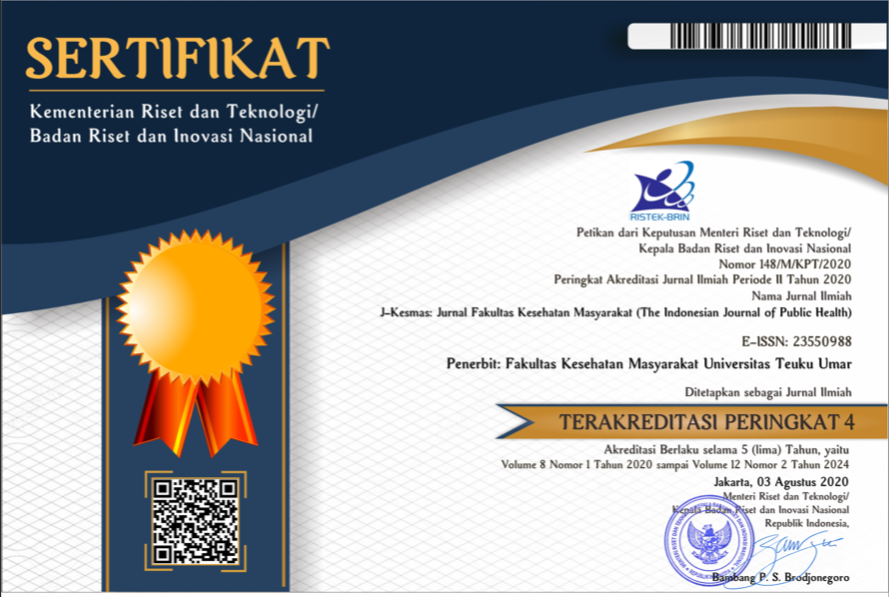The Relationship of Knowledge and Parents’ Attitudes with Children’s Potty Training in Gampong Ujong Drien
Abstract
One of the ideals of a nation is to produce a healthy and smart generation. Good generations in the future are formed from the first 1000 days of life to the age of 5 years. An important stimulus is to foster a child's independence in urinating and defecating in the toilet. The strategy that can be done by parents in teaching their children BAB and BAK is through potty training. The purpose of this study was to determine the relationship of knowledge and attitudes with potty training in under three years child’s. This research is analytic with cross sectional design. A sample of 40 toddler parents were taken using the total population technique. Chi Square test the relationship of parental knowledge with potty training obtained P Value 0.002 <0.05 so that parental knowledge with the implementation of potty training has a significant relationship. Chi Square test the relationship between parental attitudes with potty training obtained P Value 0.004 <0.05 so that parental attitudes with the implementation of potty training have a significant relationship. The conclusion of this study is that knowledge and attitudes have a significant relationship with potty training in under three years child’s. It is recommended to the Puskesmas to make an introduction to potty training programs for parents so that the implementation of potty training can be achieved optimally.
Keywords
Full Text:
PDFReferences
Brazelton, T. B., 1962. A Child-Oriented Approach to Potty Training. Pediatrics
Colson, E. R., Dworkin, P. H., 1997. Toddler Development. Pediatr. DeBord,K., 1997. Potty Training-Preparing Your Child To Use The Potty. University of New Hampshire
Ferrer-Chancy, M., McCrea, S., 2000. Potty Training. University of Florida.
Ardhiyanti, L. P. (2015). Hubungan Antara Pendidikan Ibu Dengan Keberhasilan Potty Training Pada Batita Umur 1-3 Tahun Di Bpm Ny. Hj. Ni‟mah Madzumi, S. St, MM Kes Desa Bawangan Kecamatan Ploso Kabupaten Jombang. Jurnal Kebidanan, 9(1)
Kiddoo, D. A. Potty Training Children: When To Start And How To Train. DOI: 10.1503/cmaj.110830
Wahida, N. (2016). Gambaran Pengetahuan Dan Sikap Ibu Tentang Potty Training Di Pendidikan Anak Usia Dini (Paud) Qurratu „Aini Kecamatan Mandiangin Koto Selayan Kota Bukittinggi. Jurnal Kesehatan Volume 3 No. 1, 3(1)
Gilbert, Jane. (2006). Latihan Potty : Panduan Melatih Anak untuk Mengatasi Masalah Potty (Wisyananto Suranto, Penerjemah). Jakarta : Erlangga
Irmaatus, S. (2009). Gambaran Pengetahuan Ibu tentang kesiapan potty training pada anak usia 18-24 bulan di dusun Pandantoyo Kecamatan Ngancar Kabupaten Kediri. Universitas Gadjah Mada. Diakses 06 Desember 2016.
Triningsih, T. (2014).Pengaruh Pendidikan Kesehatan Potty Training Terhadap Tingkat Pengetahuan Ibu Tentang Potty Training Di Paud Tunas Harapan KutoarjoPurworejo.Jurnal Komunikasi Kesehatan (Edisi 9), 5(2)
DOI: https://doi.org/10.35308/j-kesmas.v6i1.1189
Refbacks
- There are currently no refbacks.
Managed by Fakultas Kesehatan Masyarakat
Published by Universitas Teuku Umar
Website: http://jurnal.utu.ac.id/jkesmas
Email: jkemas@utu.ac.id 
This work is licensed under a Creative Commons Attribution-ShareAlike 4.0 International License.







.jpg)


